
HISTORY AND PHILOSOPHY OF THE LIFE SCIENCES
metrics 2024
Fostering Interdisciplinary Dialogue in Life Sciences Scholarship
Introduction
HISTORY AND PHILOSOPHY OF THE LIFE SCIENCES, published by SPRINGER INT PUBL AG, stands as a leading peer-reviewed journal dedicated to exploring the intricate relationships between historical narratives and philosophical frameworks in the life sciences. With its robust impact factor and recognized position as a Q1 journal in key categories such as Arts and Humanities, History, and History and Philosophy of Science, this journal provides a vital platform for researchers, professionals, and students seeking to delve into the theoretical underpinnings and historical trajectories shaping contemporary life sciences. Established in 1979 and evolving through its converged years until 2024, it reflects the journal's enduring commitment to advancing scholarly discourse in its field. While the journal is not open access, it nonetheless attracts a diverse readership, facilitating meaningful research exchanges and interdisciplinary dialogues. Located in the picturesque country of Switzerland, the journal invites contributions that foster critical examination and innovative thinking in the historiography and philosophy of life sciences, ultimately enhancing our understanding of this dynamic and significant discipline.
Metrics 2024
 0.48
0.48 1.60
1.60 1.50
1.50 29
29Metrics History
Rank 2024
Scopus
IF (Web Of Science)
JCI (Web Of Science)
Quartile History
Similar Journals

BIOLOGY & PHILOSOPHY
Challenging Perspectives on Life through Philosophical LensesBIOLOGY & PHILOSOPHY, published by SPRINGER, is a leading journal that explores the intricate and dynamic interplay between biology and philosophy. With an impressive impact factor in the Q1 category across multiple disciplines including Agricultural and Biological Sciences, History and Philosophy of Science, and Philosophy, this journal has firmly established itself as an essential resource for researchers, professionals, and students alike. Since its inception in 1986 and continuing through 2024, BIOLOGY & PHILOSOPHY fosters critical inquiry and discussion, inviting contributions that advance the understanding of biological sciences from philosophical perspectives. Although it operates under a traditional subscription model without Open Access options, its high Scopus rankings—#38 in Philosophy and #14 in History and Philosophy of Science—underscore its significance and influence in contemporary research. For those keen on delving deeper into the ethical, epistemological, and conceptual challenges posed by biological research, this journal serves as a compelling platform for groundbreaking scholarship.
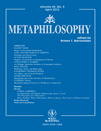
METAPHILOSOPHY
Illuminating the Path of Contemporary PhilosophyMETAPHILOSOPHY is a prominent peer-reviewed journal published by Wiley that focuses on the intricate and evolving field of philosophy. Established in 1970, it provides a critical platform for scholars to explore the fundamental principles of philosophy, serving as a bridge between philosophical inquiry and broader intellectual discourse. With an impressive ranking in the Q2 category for Philosophy and a solid ranking of #223 out of 806 in the Scopus Arts and Humanities rankings, this journal is highly regarded for its contributions that adapt to contemporary philosophical challenges. Although it does not offer Open Access options, METAPHILOSOPHY is committed to disseminating rigorous research that engages with both classical and modern philosophical debates. As it converges into the year 2024, the journal continues to be an essential resource for researchers, professionals, and students dedicated to understanding and advancing philosophical thought.
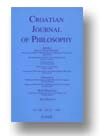
Croatian Journal of Philosophy
Advancing the Frontiers of Philosophical ThoughtCroatian Journal of Philosophy is a distinguished academic platform dedicated to the advancement of philosophical discourse, published by KRUZAK D O O. With an ISSN of 1333-1108 and an E-ISSN of 1847-6139, this journal has been a key player in the field since its inception in 2008, continuing to progress through its converged years until 2024. Recognized for its scholarly contributions, it holds a prestigious placement in Q3 within the philosophy category for 2023 and ranks #571 out of 806 in Scopus, reflecting its engagement with a broad spectrum of scholarly discussions and ideas. Though it operates without an Open Access model, the journal remains a vital resource for researchers, professionals, and students who are keen to explore contemporary and traditional philosophical issues from diverse perspectives. The journal's commitment to expanding the boundaries of philosophical inquiry emphasizes the significance of interdisciplinary dialogue, making it a reputable choice for those seeking to deepen their understanding of philosophical thought.

JOURNAL OF THE HISTORY OF BIOLOGY
Unraveling the Tapestry of Biological HistoryJOURNAL OF THE HISTORY OF BIOLOGY, published by Springer, stands as a vital academic resource devoted to examining the historical development of biological science and its philosophical dimensions. This esteemed journal, which has been in continuous publication since 1968 and encompasses research through 2024, is recognized for its significant contributions to the fields of Agricultural and Biological Sciences, and the History and Philosophy of Science, proudly holding a Q2 ranking in both categories as of 2023. With an ISSN of 0022-5010 and an E-ISSN of 1573-0387, it serves a diverse audience of researchers, professionals, and students interested in the interplay between biological advancements and historical context. The journal’s particular emphasis on interdisciplinary investigation provides a platform for innovative scholarship that enriches our understanding of not only the science itself but also its societal implications. While it does not currently offer open access, the rigor and reputation of the journal underscore its importance as a leading publication in the academic landscape of biological history.
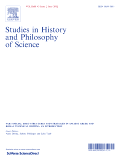
STUDIES IN HISTORY AND PHILOSOPHY OF SCIENCE
Charting the Philosophical Landscape of Scientific ProgressSTUDIES IN HISTORY AND PHILOSOPHY OF SCIENCE, published by Elsevier Science Ltd, is a leading academic journal dedicated to the exploration of historical and philosophical dimensions of science. With both an ISSN of 0039-3681 and E-ISSN of 1879-2510, this esteemed journal has established itself as a pivotal resource since its inception in 1970 and continues to publish cutting-edge research reflecting the evolution of scientific thought. Situated in the United Kingdom, it is recognized for its high-impact contributions, boasting a Q1 ranking in both History and History and Philosophy of Science categories as of 2023. Researchers in the humanities will benefit from the journal’s rigorous analysis and insightful discussions, as evidenced by its competitive Scopus rankings—placing it in the 96th and 83rd percentiles in their respective fields. Although not an open-access journal, it maintains a commitment to scholarly excellence, aiming to foster a deeper understanding of the interconnections between historical context and philosophical inquiry in the scientific domain, making it an invaluable resource for students, professionals, and researchers alike.

History of Geo- and Space Sciences
Exploring the rich tapestry of geo-science history.History of Geo- and Space Sciences is a distinguished open-access journal published by COPERNICUS GESELLSCHAFT MBH since 2010, committed to advancing knowledge in the interdisciplinary fields of Earth and planetary sciences as well as the history and philosophy of science. Based in Germany, this journal operates under ISSN 2190-5010 and E-ISSN 2190-5029, providing a platform for researchers, professionals, and students to disseminate and access high-quality scholarly articles. With a remarkable impact reflected in its 2023 Scopus rankings, placing it in Q3 for Earth and Planetary Sciences (miscellaneous) and Q2 for History and Philosophy of Science, the journal plays a crucial role in fostering dialogue and collaboration among the scientific community. It not only covers significant advancements in geo-sciences but also addresses historical perspectives and philosophical inquiries that shape our understanding of the discipline. Engage with groundbreaking research and broaden your insights by contributing to or reading articles from this pivotal journal.

Historical Studies in the Natural Sciences
Advancing Understanding through Historical ContextsHistorical Studies in the Natural Sciences is a prestigious journal published by University of California Press, dedicated to advancing the understanding and appreciation of the interconnections between natural sciences, history, and philosophy. With an ISSN of 1939-1811 and an E-ISSN of 1939-182X, this journal has established itself as a vital resource for researchers, professionals, and students interested in the historical context and philosophical implications of scientific developments. As of 2023, it holds an impressive Q3 ranking in the category of History and Philosophy of Science and ranks 76th in the Arts and Humanities domain according to Scopus, representing the 65th percentile among peers. The journal spans a convergence of studies from 2008 to 2024, offering insights that bridge gaps between historical perspectives and scientific inquiry. Open access options enhance its accessibility, fostering a broader dialogue within the academic community and beyond. This journal stands as an important platform for scholars aiming to explore the rich tapestry of natural sciences through a historical lens, contributing significantly to the ongoing discourse in the field.
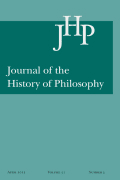
JOURNAL OF THE HISTORY OF PHILOSOPHY
Unraveling the Threads of Philosophical TraditionJOURNAL OF THE HISTORY OF PHILOSOPHY is a premier academic journal dedicated to advancing the study of philosophical thought from antiquity to modernity. Published by Johns Hopkins University Press, this esteemed journal features a range of scholarly articles that delve into the historical context, development, and impact of philosophy across civilizations. With an ISSN of 0022-5053 and an E-ISSN of 1538-4586, it boasts an impressive rank of Q1 in Philosophy as of 2023, recognizing its influence and contribution to the field. The journal, which has been publishing since 1975, offers insights that are invaluable for researchers, professionals, and students dedicated to the exploration of philosophical traditions and their legacies. Although it operates under a subscription model, the rigor and depth of the research published make it an essential resource for anyone interested in philosophical inquiry. With its commitment to scholarly excellence and critical discourse, the JOURNAL OF THE HISTORY OF PHILOSOPHY serves as a vital platform for new ideas and connections in the realm of philosophy.
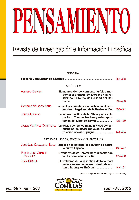
PENSAMIENTO
Innovating Ideas for a New Philosophical EraPENSAMIENTO is a distinguished journal published by the Universidad Pontificia Comillas Madrid, Faculty of Philosophy, providing a platform for scholarly discourse in the field of philosophy. With its ISSN 0031-4749 and E-ISSN 2386-5822, the journal has embraced Open Access since 2016, promoting wider dissemination of philosophical research and thought. Located in Spain, it has established itself as a vital resource for academics, researchers, and students interested in contemporary philosophical inquiries and discussions. As of 2023, PENSAMIENTO is ranked Q3 in the Arts and Humanities, specifically within the Philosophy category, highlighting its emerging impact in the scholarly community with a Scopus rank of #575 out of 806, placing it in the 28th percentile. With its coverage spanning from 2002 to 2024, PENSAMIENTO is committed to contributing to the ongoing evolution of philosophical thought and ensuring that fresh perspectives can thrive within academia.

Foundations of Science
Bridging Disciplines in the Pursuit of KnowledgeFoundations of Science is a renowned academic journal published by SPRINGER, dedicated to the interdisciplinary exploration of both the historical and philosophical dimensions of science. Established in 1995 and based in the Netherlands, this journal has carved out a significant niche within the History and Philosophy of Science and Multidisciplinary fields, holding an impressive Q2 ranking in both categories as of 2023. The journal's rigorous peer-review process ensures the dissemination of high-quality research, supported by its Scopus rankings, which place it in the top 15% of its peer group in History and Philosophy of Science and the top 28% in Multidisciplinary studies. Although not an open-access journal, Foundations of Science remains accessible through various academic channels, making its vital contributions to the discourse surrounding scientific foundations available to a broad audience. By fostering dialogue across disciplines, it plays a crucial role in advancing the understanding of science's philosophical underpinnings and its historical development, making it an essential resource for researchers, professionals, and students alike.